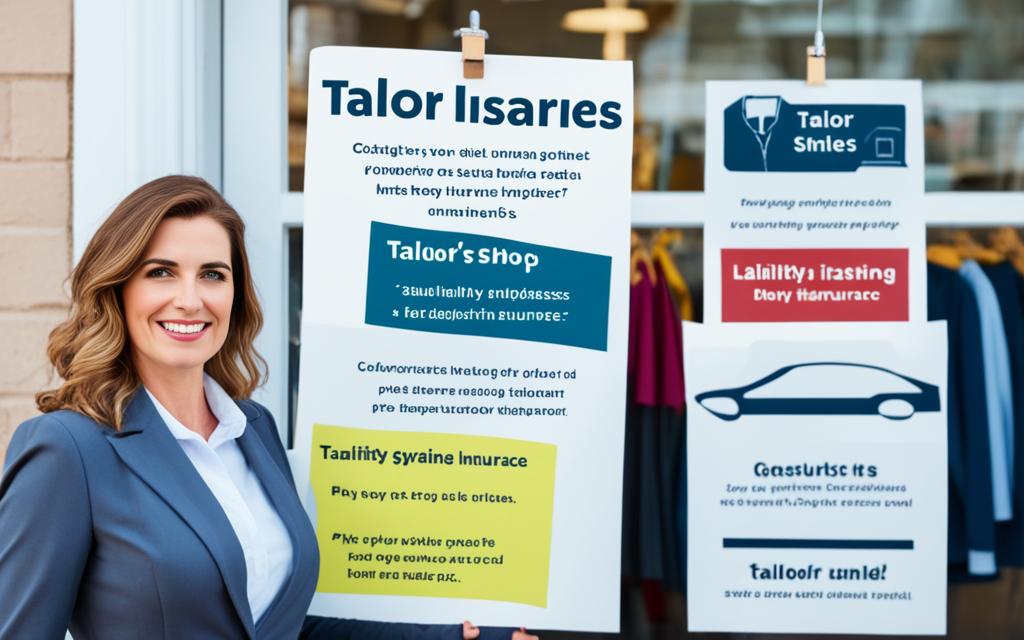As a small business owner, I need tailored insurance policies that safeguard against specific risks – from liability to property damage and beyond. Customized insurance is a critical aspect of risk management for small businesses. Off-the-shelf insurance policies may seem attractive due to their simplicity and lower initial cost, but these standard packages often have a one-size-fits-all approach, overlooking the individual circumstances and specific risks of each business. This can result in inadequate coverage, leaving small business owners vulnerable to financial devastation in the event of an accident, natural disaster, or legal action against the company.
Key Takeaways
- Customized insurance policies are essential for protecting small businesses against specific risks and threats.
- Off-the-shelf insurance policies often overlook the unique circumstances and risks of individual businesses.
- Inadequate coverage can leave small business owners financially vulnerable in the event of unexpected incidents.
- Tailoring insurance policies ensures comprehensive protection and peace of mind for the growth of your business.
- Regularly reviewing and updating insurance policies is crucial as your business evolves.
Understanding the Importance of Customized Insurance
As a small business owner, tailoring your insurance coverage to address your unique risks and threats is paramount. While off-the-shelf insurance policies may seem like a quick and affordable solution, they often lack the depth of coverage required to truly protect your enterprise. Customized insurance, on the other hand, allows for a comprehensive understanding of your business’s specific needs, ensuring you have the proper safeguards in place.
Off-the-Shelf vs. Tailored Insurance Policies
Standard, one-size-fits-all insurance policies may appear to be a simple and cost-effective option, but they frequently overlook the individual circumstances and unique risks that your small business faces. By customizing your insurance coverage, you can ensure that your policy addresses the specific threats and exposures relevant to your industry, location, operations, and financial standing. This level of personalization can provide you with the peace of mind and stability your business requires to thrive.
Addressing Unique Risks and Threats
Every small business is unique, with its own set of risks and threats that must be carefully examined and addressed. Customized insurance enables you to identify these specific vulnerabilities, whether they involve specialized equipment, industry-specific legal claims, or niche market exposures. By tailoring your coverage to these unique risks, you can safeguard your business against potential financial devastation and ensure its long-term stability.
Peace of Mind and Business Stability
Investing in customized insurance coverage is an investment in the future of your small business. By ensuring that your company is comprehensively protected against the risks that matter most, you can enjoy the peace of mind necessary to focus on growth and innovation, secure in the knowledge that your business is shielded from unexpected challenges. This stability, in turn, can contribute to the overall success and longevity of your enterprise.
Identifying Your Small Business’s Unique Risks
To accurately identify and assess the unique risks your small business faces, consider the following steps:
Understanding Your Industry’s Risks
Each industry has its own set of unique business risks, such as equipment-related risks for manufacturing companies or professional liability threats for consulting firms. Taking the time to understand the specific risks inherent to your industry is a crucial first step in developing a comprehensive risk management strategy.
Assessing Business Location Risks
The location of your business can greatly impact the risks it faces. If your business is situated in an area prone to natural disasters, such as floods, earthquakes, or hurricanes, you’ll need to ensure your insurance coverage provides adequate protection against these business location risks.
Reviewing Business Operations and Risks
Examining the various aspects of your business operations, including employees, products/services, equipment, and technology, is essential in identifying the business operations risks that could threaten your company. Each component of your operations may introduce unique risks that require specialized coverage.
Evaluating Legal and Regulatory Risks
Ensuring you’re aware of potential legal and regulatory risks specific to your industry is crucial. This could include risks such as employee discrimination claims, contractual disputes, or data breach lawsuits. Staying informed and proactive about compliance and legal requirements can help mitigate these challenges.
Considering Financial Risks
In addition to operational and legal risks, it’s important to carefully evaluate the financial risks your business may face, such as cash flow problems, investment risks, and credit risks. Addressing these potential financial threats can help ensure the long-term stability and sustainability of your small business.

Types of Customizable Insurance Coverage
One of the many advantages of customizing your insurance coverage is the ability to choose from a variety of insurance types that cater to your specific business needs. Let’s explore some of the key areas where you can tailor your coverage:
Liability Insurance
Liability insurance covers the legal costs if your business is sued for negligence. This can include professional liability, product liability, and employment practices liability. By customizing your liability coverage, you can address the unique risks and exposures your business faces, ensuring comprehensive protection against potential lawsuits.
Property Insurance
Property insurance safeguards your business premises and its contents against damages caused by events like fire, theft, or natural disasters. You can customize your property insurance to cover various properties, including your office, warehouses, or specialty equipment, as well as add-on coverages for specific risks.
Commercial Auto Insurance
Commercial auto insurance covers the vehicles that carry your employees, products, or equipment. This coverage can be tailored to different types of vehicles and usage, allowing you to address the unique transportation needs of your business.
Workers’ Compensation Insurance
Workers’ compensation insurance protects your business from legal complications if an employee suffers a work-related injury or illness. You can modify this coverage based on the number of employees, the type of work they perform, and industry-specific risks, ensuring your employees are well-protected.
Cyber Liability Insurance
Cyber liability insurance covers the costs associated with a data breach or cyber attack. As your business’s digital exposure and data storage needs evolve, you can tailor this coverage to match your unique risk profile and the type of sensitive information you handle.
Business Interruption Insurance
Business interruption insurance covers the loss of income that a business suffers after a disaster, such as a fire, natural disaster, or equipment breakdown. You can customize this coverage according to the anticipated risks and specific needs of your business, ensuring you’re prepared for unexpected disruptions.
By exploring these various types of customizable insurance coverage, you can create a tailored risk management strategy that addresses the unique needs and challenges of your small business. Working closely with your insurance provider to identify the right combination of policies will provide the comprehensive protection your enterprise requires.
Tailoring Liability Insurance to Your Business
Liability insurance is a crucial component of a comprehensive business insurance package, and customization is key to addressing the unique risks your business faces. For instance, a business that offers professional services may need to address the risk of professional liability, and can customize their coverage to include
Professional Liability Insurance
, also known as Errors and Omissions Insurance. Similarly, businesses that manufacture products for sale to consumers might face the risk of
Product Liability Insurance
, and can integrate this into their liability coverage.
By tailoring your liability insurance to address these unique exposures, you can ensure thorough protection for your business and potentially save on insurance costs by not paying for unnecessary coverage. This customized approach allows you to focus on the specific risks and threats that are most relevant to your operations, providing a robust safety net against potential legal claims or financial liabilities.

Addressing Unique Exposures
Every business is unique, with its own set of risks and exposures that must be carefully considered when designing a liability insurance policy. Whether it’s industry-specific legal risks, specialized equipment, or a niche market, working closely with your insurance provider to identify and address these unique factors is essential for ensuring comprehensive protection. By tailoring your liability coverage, you can rest assured that your business is shielded from the specific challenges it faces, giving you the peace of mind to focus on growth and success.
Commercial Property Insurance: Protecting Your Assets
Commercial Property Insurance is of paramount importance to businesses, providing much-needed protection for physical assets. Customizing your property insurance allows businesses to specifically include or exclude certain types of coverage based on their unique needs, such as covering office furniture, equipment, inventory, signage, and more.
Customizing Property Insurance Coverage
By tailoring your commercial property insurance, you can ensure that your coverage aligns with the specific requirements of your business. This might include insuring specialized equipment, securing protection against industry-specific risks, or obtaining coverage for a niche market. Customizing your policy ensures comprehensive protection for your most valuable assets.
Specialty Coverages for Specific Risks
In addition to the standard property insurance coverage, businesses can also add specialty coverages to protect against unique risks. For example, equipment breakdown insurance can safeguard your essential machinery and technology from unexpected malfunctions. This level of customization provides an extra layer of security for your commercial property.
Natural Disaster Coverage
Businesses operating in areas prone to natural disasters may need to tailor their commercial property insurance policies to include additional coverage for such events. This could involve obtaining flood insurance, earthquake coverage, or other specialized protections against the specific environmental threats in your region. Customizing your policy to address natural disaster risks ensures your business is resilient in the face of unpredictable calamities.
Commercial Auto Insurance: Adapting Coverage to Your Fleet
Commercial Auto Insurance is a non-negotiable for businesses that rely on vehicle fleets for their operations. Every vehicle in a fleet represents a potential risk, and the degree of that risk can vary significantly depending on numerous factors such as the type of vehicle, the nature of its use, and the areas it operates in. As such, adapting commercial auto insurance coverage to match individual business needs is crucial for cost-effective risk management.
Customizing your commercial auto insurance begins with an in-depth understanding of your fleet and its associated risks, allowing you to tailor the coverage to address the specific needs of your business. This could include factors such as the size and composition of your fleet management, the driving records of your employees, the types of vehicles used (e.g., delivery vans, cargo trucks, or specialty vehicles), and the geographical regions in which they operate.
By carefully analyzing these variables and working closely with your insurance provider, you can create a tailored commercial auto insurance policy that provides comprehensive protection for your business. This may involve adjusting coverage limits, adding specialized endorsements, or incorporating fleet-specific discounts to optimize your coverage and cost-effectively manage your fleet management risks.
Investing in a customized commercial auto insurance solution is a proactive step towards safeguarding your business operations and ensuring the financial stability of your company. By addressing your unique fleet management needs, you can have the peace of mind knowing that your vehicles and drivers are well-protected, allowing you to focus on driving your business forward.
Insurance for Small Businesses
As a small business owner, it’s essential to understand the importance of customizing your insurance coverage to address your unique risks and exposures. This process begins with thoroughly
Assessing Risks and Exposures
. Consider factors such as industry, location, operations, legal/regulatory environment, and financial considerations to gain a clear understanding of the potential liabilities your business faces.
Once you have identified your risks, you can work with insurance professionals to
Choose Appropriate Coverage Limits
that adequately protect your business without being over- or under-insured. This ensures your coverage aligns with the specific needs of your small business.
Additionally, you can
Add Endorsements or Riders
to your policy to address specific needs, such as location-specific coverage, cyber liability, or industry-specific risks. By taking a customized approach to your
small business insurance
Industry-Specific Insurance Coverage
As a small business owner, it’s crucial to understand that your insurance needs can vary significantly depending on the industry in which you operate. Certain industries, such as construction and technology, face unique risks and exposures that require specialized coverage to ensure comprehensive protection. By working closely with your insurance provider to identify and address these industry-specific risks, you can create a tailored insurance solution that safeguards your business against the unique challenges you face.
Construction Industry Insurance
If your small business is in the construction industry, you may need coverage for a range of risks, including third-party bodily injury or property damage resulting from construction activities, equipment breakdown or theft, and potential liabilities related to the work you perform. Customized construction industry insurance can provide protection for these specific exposures, helping to mitigate the financial impact of unexpected incidents and ensure the stability of your operations.
Technology Industry Insurance
For small businesses operating in the technology sector, the focus may shift towards coverage for data breaches, cyber attacks, and intellectual property disputes. Technology industry insurance can be tailored to address these unique risks, providing protection for your digital assets, customer information, and proprietary technologies. By securing comprehensive coverage, you can safeguard your business against the growing threats faced by technology companies and maintain the trust of your clients.

Regularly Reviewing and Updating Insurance Policies
As the business landscape continuously evolves, it’s crucial to regularly review and update your insurance policies to ensure they remain aligned with your current operations, growth trajectory, and regulatory requirements. Proactively adapting your coverage is essential for maintaining comprehensive protection and ensuring your business remains compliant with industry regulations.
Adapting to Business Growth and Changes
As your small business expands, introduces new products or services, or undergoes significant changes, it’s vital to revisit your insurance policies with your provider. This allows you to make necessary adjustments and enhancements to your coverage, such as increasing liability limits, adding specialty coverages, or modifying property insurance to address your evolving needs. By staying ahead of these changes, you can safeguard your operations and financial well-being against the unique risks your business faces.
Staying Compliant with Regulations
The regulatory landscape for small businesses is constantly shifting, and it’s essential to ensure your insurance policies keep pace. Regularly reviewing your coverage with your provider helps you identify any gaps or changes that may be required to maintain compliance with industry-specific laws and regulations. This proactive approach not only protects your business from potential fines or legal issues but also demonstrates your commitment to responsible risk management.

By making a habit of regularly reviewing and updating your insurance policies, you can adapt to the evolving needs of your business and stay ahead of regulatory changes. This commitment to proactive risk management will provide the peace of mind and stability your small business requires to thrive in an ever-changing market.
Customizing Commercial Liability Insurance
Customizing your commercial liability insurance policy is a proactive step towards protecting your business from unforeseen risks and liabilities. By assessing your risks and exposures, choosing the right coverage limits, and adding endorsements or riders, you can create a tailored insurance solution that provides comprehensive protection for your unique business needs.
Assessing Risks and Exposures
The first step in customizing your commercial liability insurance is to thoroughly evaluate the potential risks and exposures your business faces. This could include factors such as the nature of your operations, the products or services you offer, the industry you operate in, and the geographic location of your business. By understanding the specific risks your company is exposed to, you can work with your insurance provider to design a policy that addresses these concerns effectively.
Choosing Coverage Limits
Once you’ve identified the risks your business faces, you can work with your insurance provider to determine the appropriate coverage limits for your commercial liability insurance. This involves carefully considering the potential financial impact of any claims or lawsuits your business may face, and ensuring that your policy provides sufficient protection to safeguard your assets and operations.
Adding Endorsements and Riders
In addition to the core coverage provided by your commercial liability insurance policy, you may also want to consider adding endorsements or riders to further customize your protection. These can include coverage for specific risks, such as professional liability, product liability, or employment-related claims, depending on the unique needs of your business.
Remember, insurance is not just a cost but an investment in the longevity and resilience of your business. Regularly reviewing your policy and making necessary adjustments as your business evolves is crucial to ensuring your coverage remains aligned with your current operations and future growth.
Conclusion
In conclusion, as a small business owner, customizing your insurance policies is a critical step in protecting your enterprise against specific risks and threats. By understanding the importance of tailored coverage, identifying your unique business risks, and selecting from a range of customizable insurance options, you can create a comprehensive risk management strategy that provides peace of mind and stability for the future growth of your company.
Remember, insurance for small businesses is an investment in the longevity and resilience of your business, and regularly reviewing and updating your policies is essential to ensuring your coverage remains aligned with your evolving needs. Take the time to work with insurance professionals and tailor your policies to safeguard your small business against the unique challenges you face.
By prioritizing tailored insurance policies and a proactive approach to risk management, you can cultivate a strong foundation for the long-term success and stability of your small business. Embrace the benefits of comprehensive coverage and let it empower your entrepreneurial journey towards lasting growth and prosperity.
FAQ
What are the benefits of customizing insurance policies for small businesses?
How can I identify the unique risks and exposures of my small business?
What types of customizable insurance coverage are available for small businesses?
How can I tailor my liability insurance to address the specific risks of my business?
Why is it important to regularly review and update my small business insurance policies?
Source Links
- https://www.linkedin.com/pulse/finding-right-fit-customizing-insurance-your-small-business-smyth-qstue
- https://www.figfl.com/blog/5-ways-to-customize-your-commercial-liability-insurance-policy-to-fit-your
- https://www.constructionbusinessowner.com/risk-management/proactively-tailoring-your-insurance-plan-intercept-future-risk
